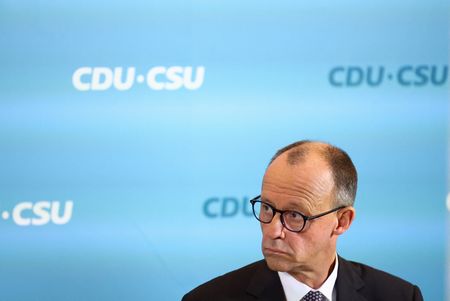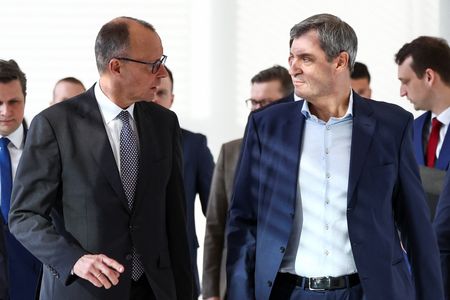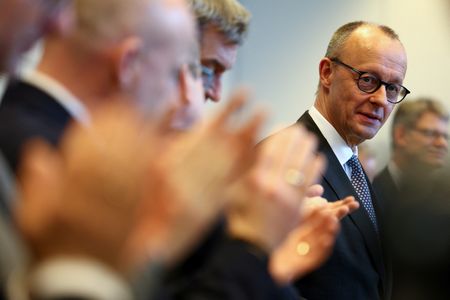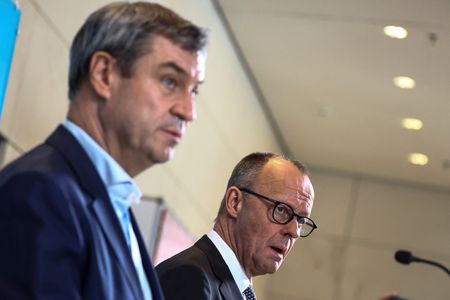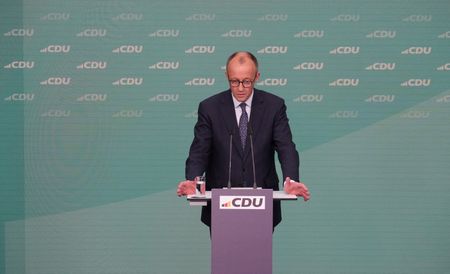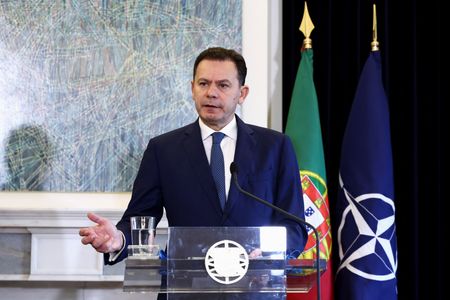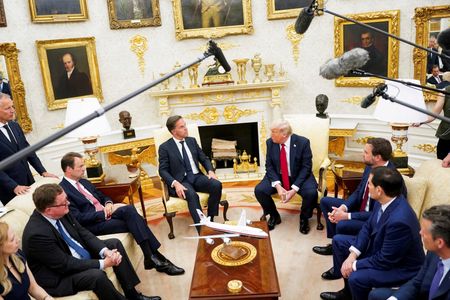By Andreas Rinke and Matthias Williams
BERLIN (Reuters) -Election winner Friedrich Merz on Tuesday ruled out a quick reform to Germany’s state borrowing limits known as the “debt brake” and said it was too soon to say whether the outgoing parliament could wave through a massive military spending boost.
Some investors and political parties are urging rapid reform of the debt brake to lift Europe’s largest economy out of the doldrums and fund an overhaul of Germany’s military that has found a new urgency with Donald Trump back in the White House.
Merz’s conservatives won national elections on Sunday but fell short of a majority, facing tricky coalition talks and the prospect of an obstructive parliament after support for far-right and far-left parties surged.
“It is out of the question in the near future that we will reform the debt brake,” he said. There is “quite a lot of work to be done, a lot of difficult work to be done”.
Germany is also considering a special fund for increased military spending and a source in Merz’s party said it could be hundreds of billions of euros.
But when asked whether he could try to achieve this in the outgoing parliament, Merz said: “We are talking to each other, but it is far too early to say anything about it now. I see it as difficult at the moment.”
NEW ANXIETIES
The debt brake reform and defence fund would each require two-thirds support in parliament, meaning success could depend on the composition of small parties which will change when the newly elected lawmakers are sworn in by March 25.
Both moves reflect anxieties about German security and the future of the transatlantic alliance since the re-election of Trump, as well as a hostile Russia and assertive China.
Britain said it would target defence spending of 3% of GDP after 2029 on the eve of Prime Minister Keir Starmer’s departure to Washington to meet the U.S. president.
Bavarian premier Markus Soeder, whose party is in the conservative bloc with Merz’s Christian Democrats, said parties should consider approving the defence fund as quickly as possible.
“It wouldn’t be a bad signal if Germany, before the normal process of forming a government takes place … took the opportunity to send a powerful international signal about its own military structure,” Soeder said.
QUICK DECISIONS
The far-left Linke, which has won more seats in the new parliament, supports reforming the borrowing rules but opposes increased defence spending. The centrist FDP, which will lose its seats in the new parliament, supports defence spending but opposes loosening the debt rules.
Jens Spahn, another lawmaker in Merz’s conservative CDU party, said the next chancellor must be able to show increased defence spending by the time of the next NATO summit in June.
Merz, who warned the United States on Monday against turning its back on allies, also urged Europeans to build up their own defences, saying it was “five minutes to midnight for Europe”.
Olaf Scholz’s outgoing government set up a 100 billion euro ($105 billion) fund to revamp Germany’s military following Russia’s 2022 invasion of Ukraine, boosting German defence spending to the NATO target of 2% of GDP.
Shares in German defence firms rose on Tuesday morning on the prospect of more defence spending.
Outgoing Defence Minister Boris Pistorius has urged Merz’s conservatives to loosen the debt brake to fund a military upgrade.
“An exception to the debt brake is practically unavoidable in order to ensure that the Bundeswehr (German armed forces) is adequately equipped,” he told the Bild newspaper.
Some military officials have lamented that the German army is less battle ready than when Russia invaded. To make the necessary investments “we are talking about more than 3% of gross domestic product,” Pistorius said.
A research note by J.P. Morgan however said “pushing through a new or larger special fund now would make a reform of the actual debt brake harder later on, as the Left, which opposes higher defence spending, may feel circumvented.”
(Reporting by Andreas Rinke, Friederike Heine and Ludwig BurgerWriting by Ludwig Burger and Matthias WilliamsEditing by Peter Graff and Ros Russell)

